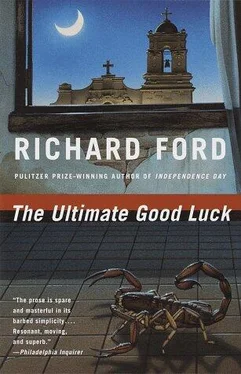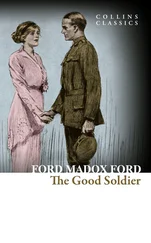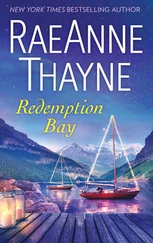Far up Cinco de Mayo there were headlights. They startled him because they were coming against the traffic, and at a speed only the police would come.
They reached the corner of Absalo, and Rae continued walking out into the intersection. Her eyes were fixed and wide and she made an attempt to pull him.
“Just do what I tell you,” he said, and jerked her backward. She looked at him, her eyes beginning to move a little, but her mouth still against her teeth. He thought for an instant she was going to speak, but then saw that she couldn’t and that it was not speaking that kept her on her feet. He looked back at Bernhardt’s office — the Mercedes, the doorway bleeding light, the gun alone on the pavement, and the casings still rolling down the gutter — and he was almost for an instant overcome with a giddy thought-erasing fear that he was going to die and it would be the wrong time for it.
The Avenue Absalo was dark, though there were regular stanchions lighting each corner block after block. The street was a comercial with pink and pale blue adobe façades. A sweet bakery smell floated in the street, and Quinn scanned the storefronts but nothing was unfamiliar and there were no alleys or cars parked, and no one was visible down the street except a man at the first corner in the oval of pale light, smoking.
Rae was walking stiffly and beginning not to breathe right, and she suddenly groaned in her chest. The man in the light looked at her but didn’t move except to transfer his cigarette from his hand to his mouth. Quinn heard the liquid murmur of tires on bricks behind him, but he didn’t want to look back. He stuck his pistol in his pants pocket, and held Rae more tightly.
As they approached under the light, the man looked over his shoulder, and Quinn saw he was the man who had shot Bernhardt. His features were the ones he had watched down the street a long way. The man’s hair was across his forehead, and the poncho was gone and he was barefoot. When they came near him, the man turned and raised his hand and touched the brim of a hat he wasn’t wearing and bowed slightly at the waist. He whispered something softly, the sound of a bee caught in a glass. The man was not out of his teens, and Quinn had the impulse to shoot him in the neck once and pay Bernhardt off for not bolting. The car coming against the traffic drifted noiselessly past the intersection. Quinn looked but it was not a police van, and then they were past the man at the light, looking onto the Avenue Juárez, which was masked and anonymous all the way down the hill toward the vapor lights in the Centro.
When they had walked ten meters, close to the store windows, Rae began to shake and then stopped walking. Her breathing became deep and quickened, and she sucked her tongue and pushed her head to the side as if she was going to be sick. He held her and pressed her shoulders against the window glass, and put his face close to hers for a long time, trying to join her breathing to his breathing, and calm her, staring through the cheap pane into an empty barbershop, at the chair and the white walls and the mirrors where he could see his reflection. And then by degrees he heard the soft suspiring night sigh of the city begin again, and Rae became erect and cool in his arms, and he could smell her breath hot and not sweet, and for a moment, with her close to him, his cheek on the cold glass, he felt himself fully located for once, and in a world in which time couldn’t pass.
THEY WAITED INSIDE the shooting arcade behind the Juárez Market. Teenagers were packed in, playing the games, drinking the mescal, and yelling. There was the anxious smell of pomade and the shabby, mesmerizing drowse of small chances being taken. Quinn stood at a machine on which a tall smiling Negress in a red sari undressed as points went up, until only her red underpants were left and then they were gone and a cat’s face smiled in her crotch and lights flashed PUSSY, and the girl’s expression changed to an embarrassed O . He kept playing it until he couldn’t lose.
Rae sat on the wooden bench against the wall. Soldiers wandered in and stood in the door, lingering a moment considering her, then walked back outside.
At midnight Quinn came and sat beside her. The popping, clanging of the shooting games was loud and submerging, and he tried just for a moment to hold things in place. Luck was infatuated with efficiency. But he couldn’t work that trick now. He thought about driving into St. Louis, headed overseas, about the slow uneventful evening’s ease of time out of Illinois and verging on the realization of being nowhere at all that mattered. He took a room downtown and walked up Olive Street to where the sun was pink and gold, and the old brick warehouses relaxed in a deep, slumbrous shadow. He remembered perfectly buying a cigar and two quarts of beer in a paper sack and walking down in the dusk to see the Cards, all so that he could not think for a time about going to Vietnam. A pressure seemed released and an inevitability forged, and he thought about the day with longing. And his mind now seemed to want that and nothing else.
“I’m over my head,” Rae said, staring at the violet and yellow machines. Her voice was steady. She touched his hand with cold fingers.
“Let it go,” he said. “You’re flying out of here tomorrow.”
She seemed not to hear. “Do you know that man who killed him?”
“No,” Quinn said.
“Do you know who Carlos was calling?”
“I wouldn’t guess.”
She seemed removed from talk as if she was already gone. “Do we have any chances left?”
He stared at the Negress in her sari, waiting to be undressed. He wanted to play it again. “We’re not even in it,” he said.
“Can’t you see Zago?”
“I can’t think about him right now.”
“If you aren’t leaving …” she said and arranged her hands in her lap. “You used to say I made you feel lucky. Is that all gone now too?”
“I thought this was what I had to do to have you back.”
“That’s silly,” Rae said. “It just seemed convenient.”
He looked down the dark row of shooting games at the Mexican boys pouring money in. He reached in his pocket and felt his pistol. One of the children began banging on his machine and cursing in Spanish. The other players stopped and stared at him until he broke the glass on the machine. They all seemed fixed and detached in a pleasing way that made him want to stay in the gallery a long time.
“Let’s get out of here,” Rae said. “It reminds me of the dogs too much.”

There were no more taxis, and the buses had quit at midnight. He led Rae up the Twentieth of November Street through the vegetable stands behind the market toward the zócalo. The street-lamps were off and a foreign blue light misted the air, stars pale and bristling above the alley openings. It made his mind clear. The Christmas lights were still lit in the zócalo, but the cafés in the Portal were shut and the metal tables stacked inside. He walked her across the empty park with his arm around her shoulders. The Baskin-Robbins had been boarded and the soldiers patrolling the Centro were inattentive or asleep on their feet.
The dining tables he had seen from Bernhardt’s car were still lined across the hotel atrium. The clerk stood behind the high desk listening to a radio and rolling dice with himself. He looked at them as though he’d seen them before but didn’t care. Quinn said in Spanish that there was a room and he wanted it. The clerk’s look became drowsy, and he fingered a file in a drawer, then pulled a card. He studied the card awhile, as if he was trying to find what was wrong with it, then he smiled at Rae and laid the card on the desk top.
Читать дальше








![Theresa Cheung - The Dream Dictionary from A to Z [Revised edition] - The Ultimate A–Z to Interpret the Secrets of Your Dreams](/books/692092/theresa-cheung-the-dream-dictionary-from-a-to-z-r-thumb.webp)




